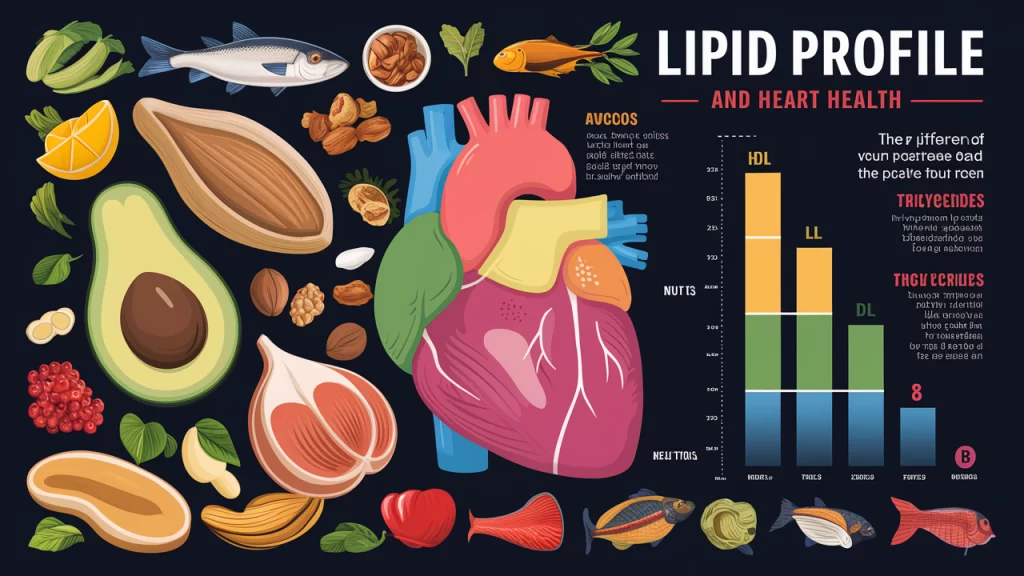Lipid Profile: Understanding Heart Health Through Natural Nutrition
As health-conscious individuals in India, we believe in the power of natural and clean food. Let us explore the concept of lipid profile testing and its significance in maintaining heart health, with a focus on vegetarian and organic food choices.
Key Facts About Lipid Profile
- A lipid profile is a set of blood tests measuring various types of fats in your body
- It includes tests for total cholesterol, LDL, HDL, and triglycerides
- Regular testing helps assess the risk for heart disease and other cardiovascular conditions
- A healthy diet and lifestyle play a crucial role in maintaining optimal lipid levels
Understanding Lipid Profile
The Importance of Lipid Testing
In India, where heart disease is on the rise, understanding your lipid profile is crucial for maintaining cardiovascular health. This comprehensive blood test evaluates the levels of different fats in your body.
Components of a Lipid Profile Test
- Total Cholesterol
- LDL (Low-Density Lipoprotein) Cholesterol
- HDL (High-Density Lipoprotein) Cholesterol
- Triglycerides
The Power of Vegetarian and Organic Foods
Embracing Plant-Based Nutrition
Our rich tradition of vegetarian cuisine offers natural ways to improve our lipid profile:
- Incorporate more leafy greens like palak, methi, and amaranth
- Include fiber-rich legumes such as rajma, chana, and moong dal
- Enjoy heart-healthy nuts and seeds like almonds, walnuts, and flaxseeds
Benefits of Organic Foods
Choosing organic produce can enhance the positive impact on your lipid profile:
- Reduced exposure to harmful pesticides and chemicals
- Higher nutrient content in organic fruits and vegetables
- Better overall health outcomes due to cleaner, more natural food sources

Ayurvedic Wisdom for Heart Health
Ancient Remedies for Modern Concerns
Ayurveda offers valuable insights for maintaining a healthy lipid profile:
- Incorporate heart-friendly spices like haldi, dalchini, and methi
- Practice oil pulling with cold-pressed organic oils like til or nariyal
- Try Ayurvedic herbs such as Arjuna and Guggulu, known for their cardiovascular benefits
Lifestyle Modifications for Optimal Lipid Levels
Embracing Holistic Health Practices
- Practice yoga and meditation to reduce stress
- Engage in regular physical activity, such as brisk walking or cycling
- Get adequate sleep to support your body’s natural healing processes
Conclusion: Taking Action for Heart Health
Understanding and monitoring your lipid profile is essential for maintaining cardiovascular health. By embracing a vegetarian diet rich in organic, whole foods and incorporating traditional Indian wisdom, you can naturally improve your lipid levels and reduce the risk of heart disease.
Take action today by scheduling a lipid profile test and making conscious choices about your diet and lifestyle. Remember, prevention is always better than cure, and by nurturing your body with clean, natural foods, you’re investing in your long-term health and well-being.
As the ancient wisdom goes, “Let food be thy medicine and medicine be thy food.” By adopting this philosophy and making informed choices about our nutrition, we can take significant steps towards better heart health and overall well-being.
Lipid Profile: Understanding Heart Health Through Natural Nutrition
As health-conscious individuals in India, we believe in the power of natural and clean food. Let us explore the concept of lipid profile testing and its significance in maintaining heart health, with a focus on vegetarian and organic food choices.
Key Facts About Lipid Profile
- A lipid profile is a set of blood tests measuring various types of fats in your body
- It includes tests for total cholesterol, LDL, HDL, and triglycerides
- Regular testing helps assess the risk for heart disease and other cardiovascular conditions
- A healthy diet and lifestyle play a crucial role in maintaining optimal lipid levels
Understanding Lipid Profile
The Importance of Lipid Testing
In India, where heart disease is on the rise, understanding your lipid profile is crucial for maintaining cardiovascular health. This comprehensive blood test evaluates the levels of different fats in your body.
Components of a Lipid Profile Test
- Total Cholesterol
- LDL (Low-Density Lipoprotein) Cholesterol
- HDL (High-Density Lipoprotein) Cholesterol
- Triglycerides
The Power of Vegetarian and Organic Foods
Embracing Plant-Based Nutrition
Our rich tradition of vegetarian cuisine offers natural ways to improve our lipid profile:
- Incorporate more leafy greens like palak, methi, and amaranth
- Include fiber-rich legumes such as rajma, chana, and moong dal
- Enjoy heart-healthy nuts and seeds like almonds, walnuts, and flaxseeds
Benefits of Organic Foods
Choosing organic produce can enhance the positive impact on your lipid profile:
- Reduced exposure to harmful pesticides and chemicals
- Higher nutrient content in organic fruits and vegetables
- Better overall health outcomes due to cleaner, more natural food sources
Ayurvedic Wisdom for Heart Health
Ancient Remedies for Modern Concerns
Ayurveda offers valuable insights for maintaining a healthy lipid profile:
- Incorporate heart-friendly spices like haldi, dalchini, and methi
- Practice oil pulling with cold-pressed organic oils like til or nariyal
- Try Ayurvedic herbs such as Arjuna and Guggulu, known for their cardiovascular benefits
Lifestyle Modifications for Optimal Lipid Levels
Embracing Holistic Health Practices
- Practice yoga and meditation to reduce stress
- Engage in regular physical activity, such as brisk walking or cycling
- Get adequate sleep to support your body’s natural healing processes
Conclusion: Taking Action for Heart Health
Understanding and monitoring your lipid profile is essential for maintaining cardiovascular health. By embracing a vegetarian diet rich in organic, whole foods and incorporating traditional Indian wisdom, you can naturally improve your lipid levels and reduce the risk of heart disease.
Take action today by scheduling a lipid profile test and making conscious choices about your diet and lifestyle. Remember, prevention is always better than cure, and by nurturing your body with clean, natural foods, you’re investing in your long-term health and well-being.
As the ancient wisdom goes, “Let food be thy medicine and medicine be thy food.” By adopting this philosophy and making informed choices about our nutrition, we can take significant steps towards better heart health and overall well-being.

